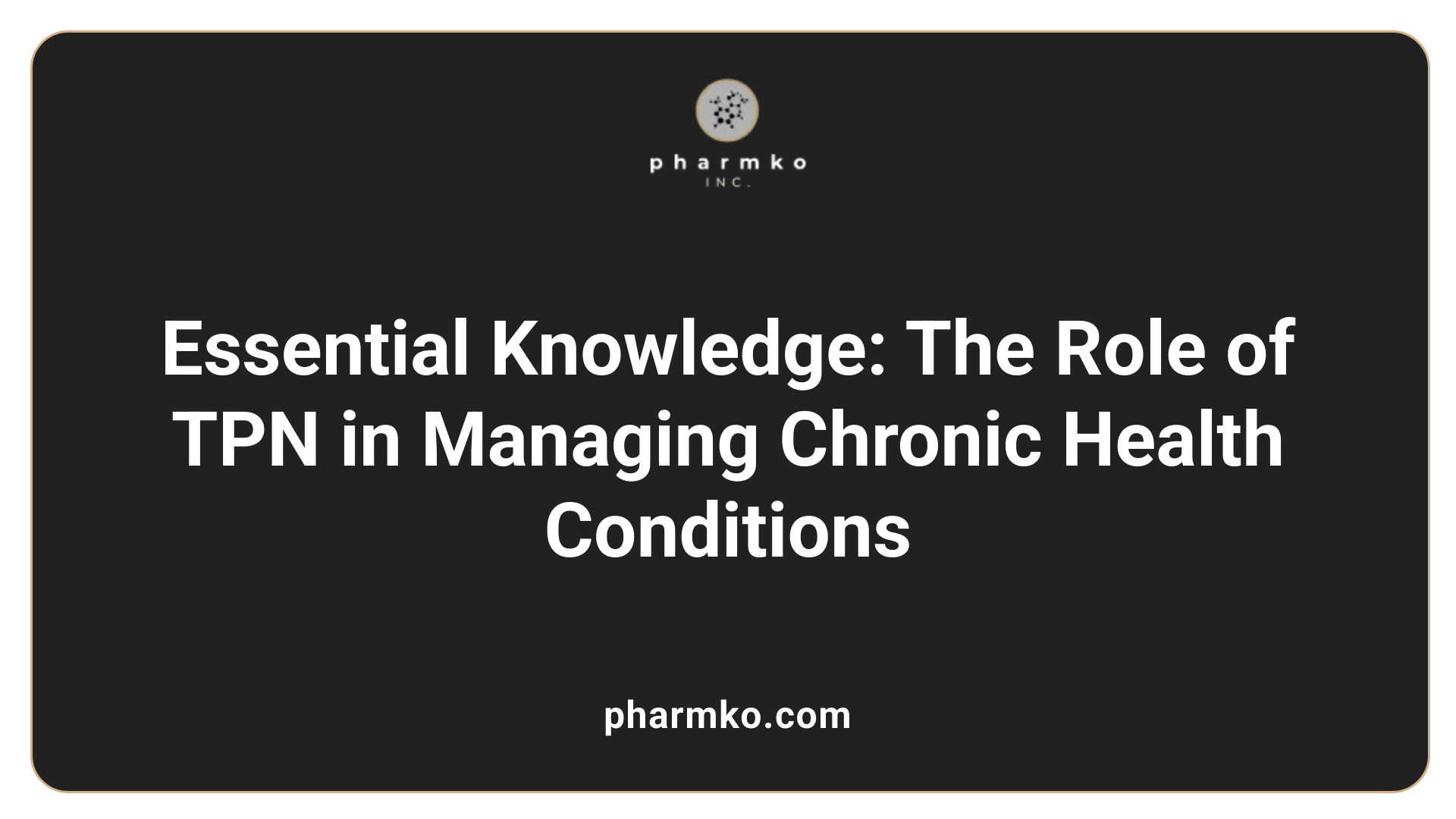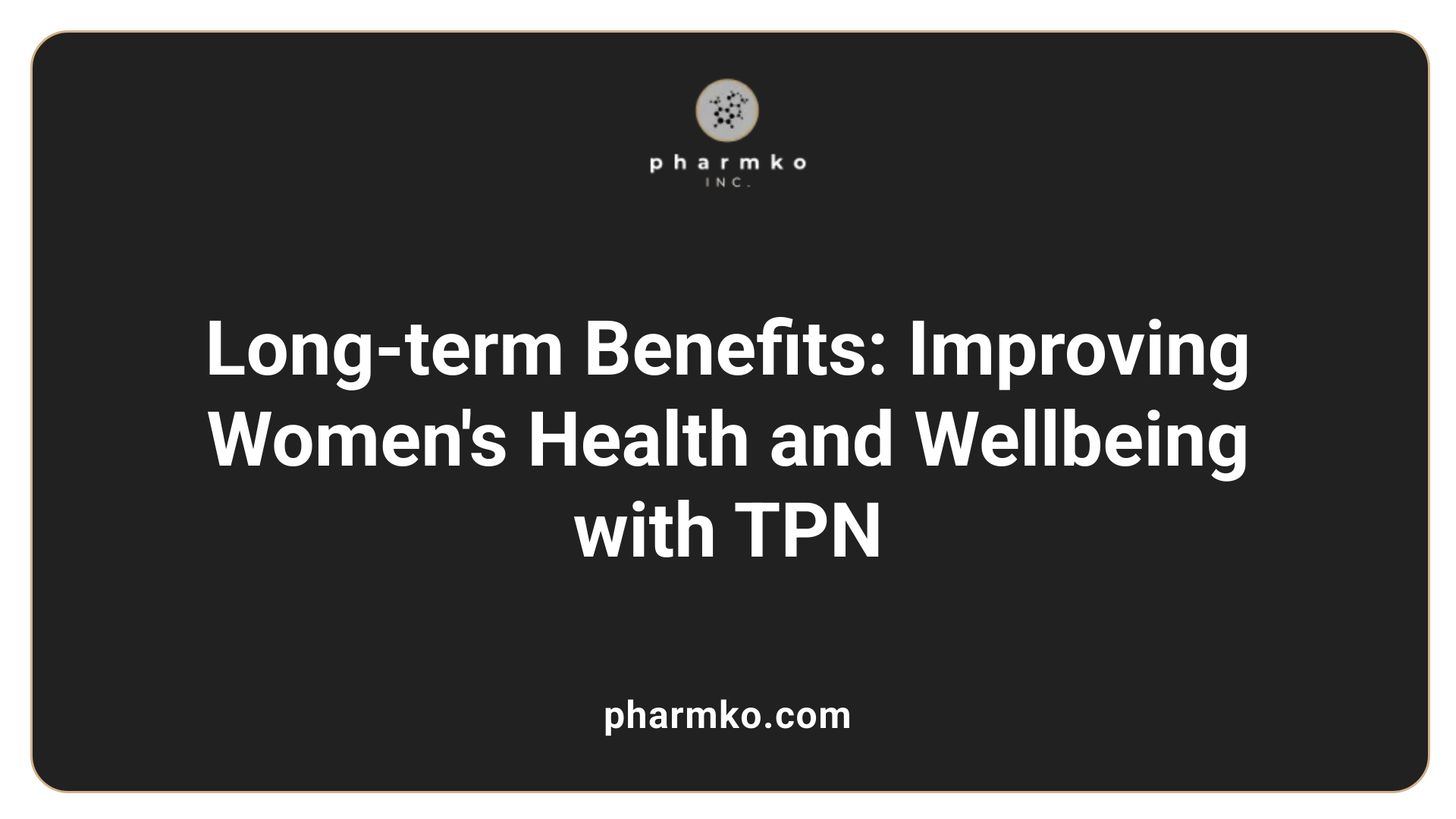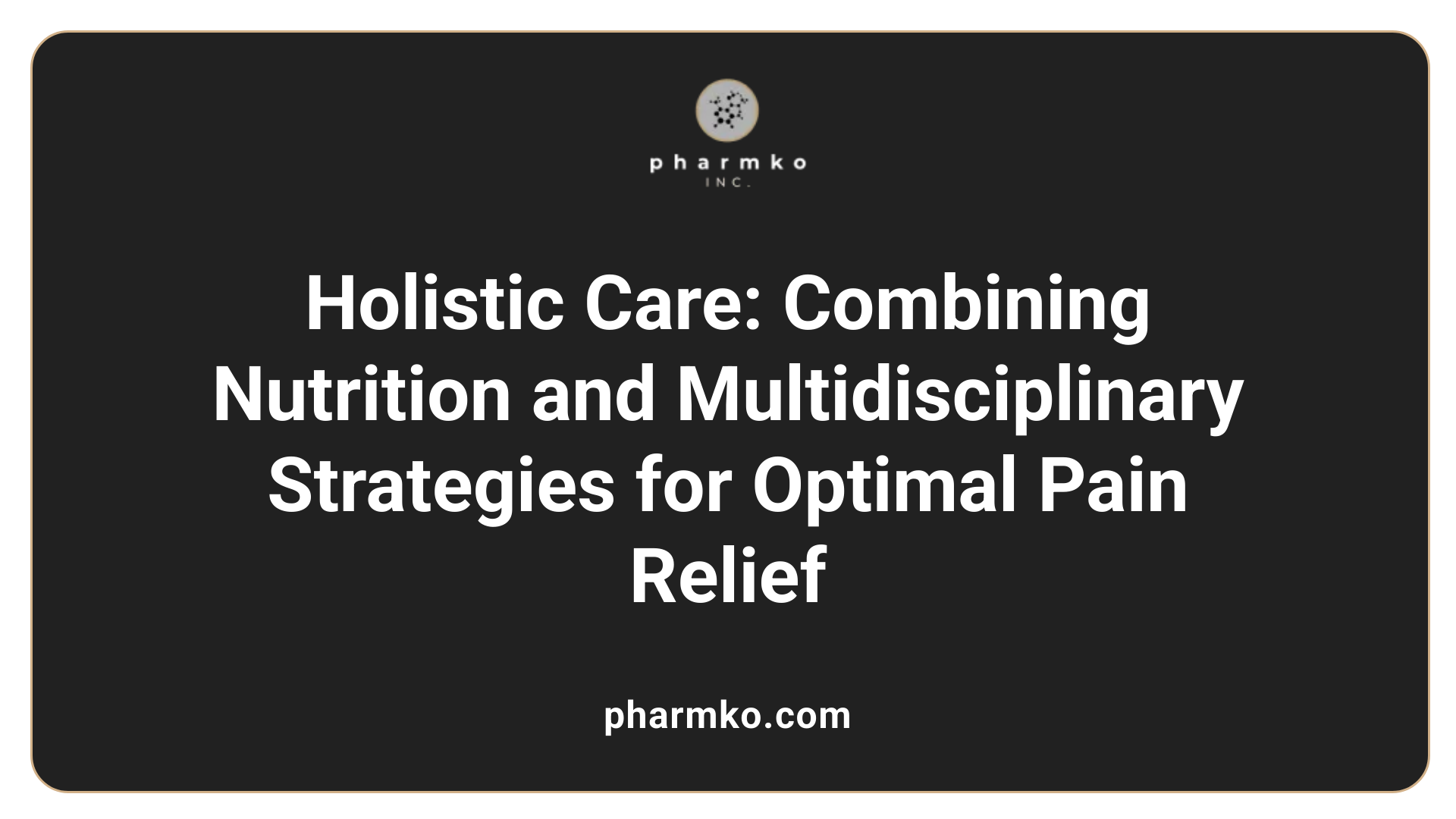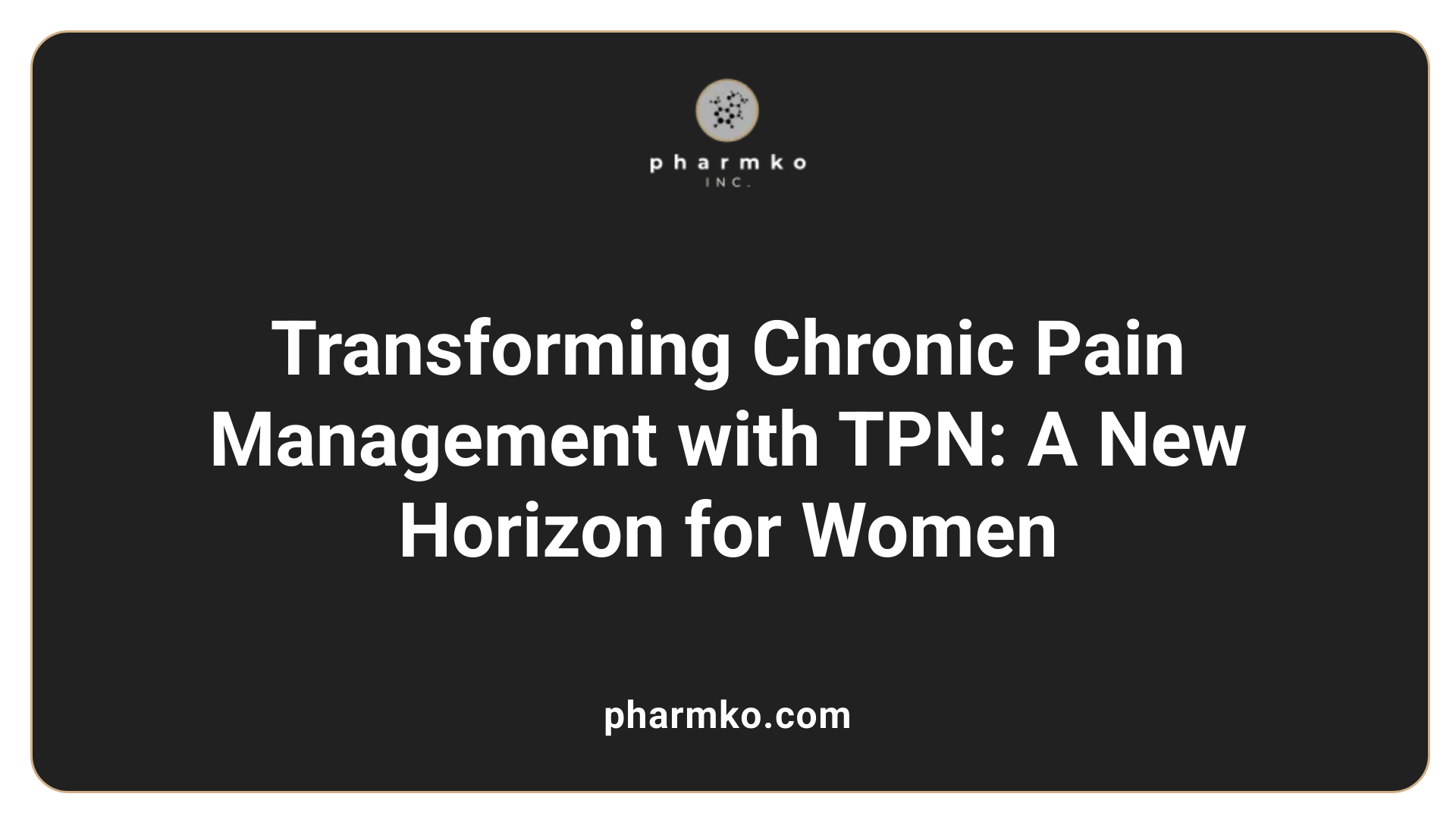How TPN Improves Outcomes for Women with Chronic Pain Conditions
Understanding the Role of Total Parenteral Nutrition in Enhancing Patient Outcomes
Chronic pain conditions in women pose complex challenges that require multidimensional management strategies. Among emerging therapies, Total Parenteral Nutrition (TPN) offers promising avenues for improving health outcomes by addressing underlying nutritional deficiencies and modulating pain-related mechanisms. This article explores the mechanisms, clinical applications, benefits, and potential risks of TPN in women suffering from chronic pain, grounded in scientific evidence and best practice guidelines.
Fundamentals of TPN and its Clinical Use in Chronic Conditions

What is TPN?
Total parenteral nutrition (TPN) is an advanced method of providing essential nutrients directly into a patient’s bloodstream through an intravenous (IV) line. Unlike oral or enteral feeding, TPN bypasses the digestive system entirely, delivering proteins, carbohydrates, fats, vitamins, minerals, electrolytes, trace elements, and water directly into circulation.
This approach is critical for patients whose gastrointestinal (GI) tract cannot be used due to conditions such as bowel obstruction, digestive tract cancer, inflammatory bowel disease, or after bowel surgery. TPN can be administered centrally via a large vein or peripherally through a smaller vein, depending on the duration of therapy and patient needs.
When is TPN recommended for chronic health issues?
The decision to initiate TPN typically occurs when a patient cannot meet nutritional needs through regular eating or enteral feeding. It is often used in acute settings, but many patients with chronic health issues rely on long-term or even lifelong TPN.
Patients with severe digestive conditions that impair nutrient absorption or cause malnutrition benefit significantly from TPN. For example, individuals with chronic inflammatory diseases or certain cancers of the digestive system may require TPN when oral or enteral routes are insufficient or impossible.
In the context of chronic pain and nutritional deficiencies, TPN serves as a method to restore vital nutrients that influence inflammatory processes and neurological health. Nutrients like vitamin D, omega-3 fatty acids, and magnesium are essential for controlling inflammation and pain. By correcting deficiencies with TPN, healthcare providers aim to improve overall health, strengthen immune function, and potentially alleviate some pain symptoms.
Long-term TPN therapy can provide a vital life-sustaining option for these patients. For some, especially those with incurable diseases, TPN may be a crucial part of quality-of-life management, often combined with psychosocial support and regular monitoring for potential complications like infections, metabolic imbalances, and liver problems.
Overall, TPN is a valuable tool in managing complex, chronic conditions where nutritional support is necessary to improve health outcomes and reduce disease-related burdens.
The Intersection of Nutrition and Pain: How Diet Affects Chronic Pain in Women
How do dietary interventions influence chronic pain management?
Dietary choices play a substantial role in managing chronic pain, especially in women. Nutrient-rich diets such as the Mediterranean pattern are linked to reduced inflammation, better sleep, and metabolic health, all of which contribute to lower pain severity.
Incorporating functional foods like turmeric, ginger, peppermint, and green tea, which contain bioactive compounds with anti-inflammatory and analgesic properties, can help alleviate pain symptoms.
Conversely, diets high in ultra-processed foods (UPFs) are associated with increased inflammation. UPFs tend to have a high glycemic index and low nutrient density, often exacerbating pain conditions like fibromyalgia and diabetic neuropathy.
Research supports that reducing UPFs and shifting toward whole-food diets can lead to significant improvements in pain levels and overall quality of life.
Can weight loss and nutritional quality improve chronic pain?
Yes, achieving weight loss through dietary modifications can significantly improve mobility and reduce pain, often independently of other factors.
Enhancing dietary quality involves increasing intake of nutrient-dense foods—like omega-3 fatty acids, magnesium, and vitamin D—and decreasing refined carbohydrates and UPFs.
Such changes lower systemic inflammation, a key factor in pain perception. Nutritional improvements support cellular repair, nerve function, and immune responses, which collectively help lessen pain symptoms.
| Dietary Aspect | Effect on Pain | Additional Details |
|---|---|---|
| Omega-3 Fatty Acids | Reduce inflammation | Found in fatty fish, flaxseeds, walnuts |
| Micronutrients (e.g., D, Mg) | Support nerve and immune health | Supplements may be considered |
| Low Glycemic Index Foods | Minimize blood glucose spikes | Whole grains, vegetables, nuts |
| Reduction of UPFs | Decrease pro-inflammatory compounds | Emphasis on whole, minimally processed foods |
Overall, combining weight management with improved nutrition enhances the body's ability to counteract chronic pain pathways, leading to better functional mobility and symptom relief.
Scientific Evidence Supporting TPN’s Efficacy and Outcomes
 Research supports the use of Total Parenteral Nutrition (TPN) as an effective tool for managing patients with compromised gastrointestinal (GI) function. When combined with enteral feeding, TPN contributes to better health outcomes, especially in critically ill patients. Studies reveal that ICU patients receiving more than 10% of their total caloric intake through enteral support alongside TPN exhibit improved clinical results. This combined approach helps optimize nutritional intake, supporting immune function, wound healing, and recovery.
Research supports the use of Total Parenteral Nutrition (TPN) as an effective tool for managing patients with compromised gastrointestinal (GI) function. When combined with enteral feeding, TPN contributes to better health outcomes, especially in critically ill patients. Studies reveal that ICU patients receiving more than 10% of their total caloric intake through enteral support alongside TPN exhibit improved clinical results. This combined approach helps optimize nutritional intake, supporting immune function, wound healing, and recovery.
Long-term data demonstrate promising survival rates for patients on TPN therapy. For instance, one multicenter study reports an 88% survival probability at one year, 74% at three years, and approximately 64% at five years for patients managed at home. The survival rates largely depend on the underlying condition, but most deaths are attributable to disease progression rather than TPN complications, of which only about 9% are related directly to the therapy.
The clinical benefits extend beyond survival. TPN can be life-saving and life-sustaining in cases of bowel obstruction, inflammatory bowel disease, or post-surgical bowel impairment. It provides all essential nutrients, including proteins, carbohydrates, fats, vitamins, minerals, electrolytes, and water, directly into the bloodstream. This bypass of the GI tract is vital when absorption is impaired or impossible, such as in advanced cancer or severe bowel injury.
Effective management of TPN requires strict adherence to established guidelines and best practices. Administered by a multidisciplinary team—including physicians, dietitians, pharmacists, and nurses—TPN involves careful formulation and proper catheter placement to minimize risks. Continuous monitoring of blood tests (like electrolytes and blood sugar) and clinical signs is essential to prevent metabolic and infectious complications. These measures ensure that TPN delivers maximum benefit while safeguarding patient safety.
Overall, evidence indicates that when managed appropriately, TPN not only sustains life but also enhances quality of life for those with long-term or acute needs, highlighting its critical role in modern nutritional therapy.
TPN’s Impact on Women’s Long-term Health and Quality of Life

What is the typical duration of survival for patients dependent on TPN?
The length of time a patient on TPN can survive varies widely depending on their underlying health conditions and response to treatment. Research shows that the 3-year survival rate ranges between 65% and 80%. Advances in TPN formulations, including better nutrient delivery and monitoring, have led to improved safety and increased longevity for many patients. Some individuals may continue TPN therapy for several years or even lifelong if necessary.
In cases where patients do not respond well to TPN or develop complications such as infections or metabolic imbalances, options like intestinal transplantation might be considered. Overall, many patients, including women with chronic conditions, can expect a survival span reaching several years, especially when managed by skilled healthcare teams. The outlook depends on factors like disease severity, nutritional management, and the presence of secondary health issues.
| Survival Duration | Approximate Percentage | Factors Affecting Survival | Additional Notes |
|---|---|---|---|
| 1 year | 88% | Quality of care, underlying condition | High initial success rate |
| 3 years | 74% | Response to TPN, complications | Median survival time |
| 5 years | 64% | Disease progression, comorbidities | Long-term outlook |
How does TPN influence overall wellbeing and psychological health?
For women undergoing long-term TPN therapy, mental health and emotional resilience are crucial components of overall wellbeing. Studies have shown that higher levels of psychological flexibility (PF) and self-compassion (SC) are linked to better health-related quality of life, including lower levels of distress, anxiety, and depression.
While TPN provides essential nutrients that support physical health, addressing mental health concerns through psychosocial support can lead to significant benefits. Women with chronic conditions on TPN often face social and emotional challenges, such as social isolation or changes in daily routines. Enhancing psychological resilience and fostering self-care practices can improve mood and reduce stress.
Providing emotional and social support alongside physical treatment helps patients better cope with the demands of long-term TPN therapy. This holistic approach can lead to increases in wellbeing, better mood, and a more positive outlook on life, ultimately improving adherence and health outcomes.
| Factors | Associated Outcomes | Impact on Quality of Life |
|---|---|---|
| Psychological flexibility (PF) | Lower distress, lower anxiety, better overall wellbeing | Enhances emotional resilience |
| Self-compassion (SC) | Reduced depression, less stress | Promotes positive self-image |
| Proper support and monitoring | Fewer complications, higher adherence | Improves social and emotional health |
By integrating mental health support with nutritional care, women on TPN can experience a better balance between physical health and emotional stability. This synergy is essential for optimizing long-term survival and quality of life.
Integrating Nutritional Support with Multidisciplinary Pain Management

What is the role of nutritional interventions in conjunction with other pain management strategies?
Nutritional interventions, including Total Parenteral Nutrition (TPN), are increasingly recognized as vital components of comprehensive pain management, especially for patients with complex or chronic conditions. When combined with other therapies such as medications and physical rehabilitation, proper nutrition can significantly reduce inflammation and correct deficiencies that may exacerbate pain symptoms.
Supporting immune and neuroimmune functions through effective nutrition helps improve overall health, enabling better responses to pharmacological and physical treatments. Dietary modifications, such as adopting anti-inflammatory diets rich in omega-3 fatty acids, antioxidants, and functional foods like turmeric and ginger, can further diminish pain and enhance therapeutic outcomes.
Patient education about lifestyle adjustments, including nutrition and activity, along with psychosocial support, creates an integrated approach that addresses both the physical and emotional elements of chronic pain. This holistic strategy not only improves pain control but also boosts quality of life.
How important is patient education and psychosocial support in long-term TPN therapy?
In cases where long-term TPN is needed, patient education plays a crucial role in ensuring safe administration, adherence, and management of potential complications. Patients and caregivers must understand the importance of maintaining proper nutrition, recognizing warning signs of infections or metabolic imbalances, and adhering to monitoring schedules.
Psychosocial support complements medical management by addressing emotional well-being, reducing feelings of isolation, and fostering resilience. Higher levels of psychological flexibility and self-compassion are associated with better adherence to therapy and lower levels of distress, which are essential for sustained treatment success.
Incorporating mental health support into the care plan can improve overall outcomes, helping patients cope with the challenges of long-term nutritional therapy. This comprehensive approach ensures that patients not only survive but also maintain a good quality of life amidst complex health needs.
Conclusion: TPN as a Transformative Approach in Chronic Pain Care for Women

What are the benefits and considerations of using TPN for women with chronic pain?
Total Parenteral Nutrition (TPN) is a vital option for patients unable to absorb nutrients through their gastrointestinal tract. It supplies all essential nutrients directly into the bloodstream, supporting immune function and reducing inflammation, which can help alleviate pain.
Research indicates that combining TPN with enteral feeding—where more than 10% of caloric intake is delivered through the gut—leads to better outcomes. Such combined support improves overall clinical results, especially in critically ill or chronically ill women.
However, TPN requires careful management. Regular monitoring, including blood tests for electrolytes, blood sugar, and liver health, is crucial to minimize risks like infections, metabolic imbalances, or long-term complications such as liver disease.
How does TPN impact outcomes and future management of women with chronic pain?
TPN has promising potential to improve health outcomes for women suffering from persistent pain, especially when nutritional deficits play a role. By supporting immune regulation and reducing systemic inflammation, TPN can help manage the severity of pain and improve quality of life.
This approach may be particularly useful for women with conditions like cancer, bowel obstructions, or inflammatory diseases who cannot tolerate oral or enteral nutrition. As future research explores personalized nutritional strategies, TPN could become more integrated into comprehensive pain management plans that include dietary modifications and psychosocial support.
What are the key takeaways for incorporating TPN into pain management?
Implementing TPN into a pain management strategy involves a multidisciplinary team to select suitable patients and ensure proper use. Regular assessments and adherence to clinical protocols are essential to prevent complications.
The benefits extend beyond providing calories—they include restoring nutritional balance, modulating inflammation, and supporting nerve and immune health. When combined with dietary and psychological interventions, TPN can significantly improve mobility, mood, and overall wellbeing in women with chronic pain.
As scientific understanding advances, TPN's role in personalized, holistic pain care is poised to grow, emphasizing the importance of integrated treatment plans that address physical, nutritional, and emotional health aspects.
| Aspect | Considerations | Impact on Pain Management |
|---|---|---|
| Nutritional Support | Careful patient selection and monitoring | Reduces deficiencies and inflammation |
| Psychological Wellbeing | Combine with psychosocial care | Improves mental health and pain coping |
| Long-term Use | Managed by trained team | Supports sustained health benefits |
| Future Directions | Need for personalized protocols | Enhances effectiveness and safety |
This comprehensive approach highlights TPN’s potential to be a cornerstone in modern, personalized care for women with chronic pain, especially when managed with expertise and holistic strategies.
Harnessing Nutritional Strategies for Better Outcomes
As research underscores the significant role of nutrition in modulating chronic pain, TPN emerges as a vital tool in the clinician’s armamentarium for women suffering from persistent pain conditions. When implemented within a multidisciplinary framework and supported by ongoing research, TPN can lead to meaningful improvements in health, function, and quality of life. Holistic, patient-centered care that integrates nutritional support with psychological and physical therapies holds the promise of transforming pain management paradigms for women—paving the way for more effective, sustainable treatment outcomes.
References
- Combined enteral feeding and total parenteral nutritional support ...
- How Total Parenteral Nutrition (TPN) Works - Verywell Health
- [PDF] Mediterranean Journal of Clinical Psychology
- TPN Life Expectancy: How Long Can Someone Live on TPN Alone?
- [PDF] Diet, nutrition, and functional foods for chronic pain - Frontiers
- Complications - Total Parenteral Nutrition - Stanford Health Care
- Complications and Monitoring – Guidelines on Parenteral Nutrition ...













